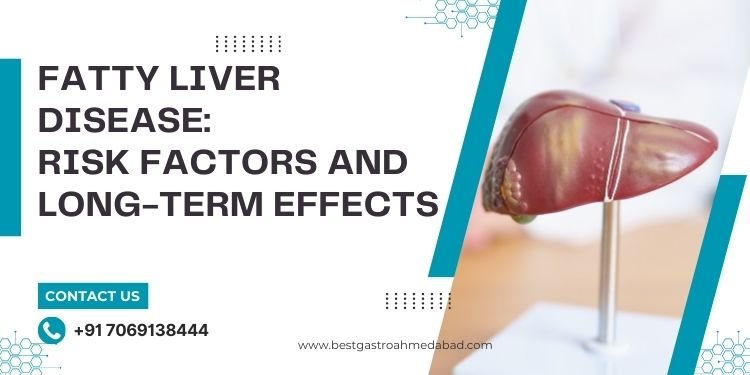Fatty Liver Disease: Risk Factors and Long-Term Effects

Fatty liver disease, also known as hepatic steatosis, is becoming increasingly common as lifestyle factors like poor diet and sedentary habits contribute to its rise. This condition occurs when excess fat builds up in liver cells, leading to inflammation, liver damage, and, if untreated, severe complications such as liver cirrhosis or failure.
Dr. Vatsal Mehta, one of the best gastroenterologists in Ahmedabad, explains the critical risk factors and long-term effects of fatty liver disease to help patients take early preventive steps.
Key Risk Factors for Fatty Liver Disease
Fatty liver disease can affect anyone, but certain risk factors significantly increase the likelihood of developing this condition. These include:
- Obesity: Being overweight or obese is one of the leading causes of fatty liver disease, particularly non-alcoholic fatty liver disease (NAFLD). Excess fat around the abdomen is particularly dangerous for liver health.
- Type 2 Diabetes: Insulin resistance and high blood sugar levels can lead to fat accumulation in the liver, making diabetic individuals more prone to fatty liver disease.
- High Cholesterol and Triglycerides: Elevated levels of these fats in the blood increase the risk of liver fat buildup.
- Alcohol Consumption: Excessive alcohol intake is a major risk factor for alcoholic fatty liver disease (AFLD). Over time, alcohol can cause inflammation, scarring, and significant liver damage.
- Metabolic Syndrome: A combination of high blood pressure, high blood sugar, abnormal cholesterol levels, and excess body fat increases the likelihood of developing fatty liver disease.
- Genetics: Family history plays a role. If you have close relatives with fatty liver disease or other liver conditions, you may be at a higher risk.
- Sedentary Lifestyle: Lack of physical activity contributes to obesity and poor metabolic health, both of which increase the risk of fatty liver disease.
Long-Term Effects of Fatty Liver Disease
If left untreated, fatty liver disease can progress to more serious liver conditions. Dr. Mehta emphasizes the importance of early detection and treatment to avoid long-term complications, such as:
- Liver Fibrosis: Persistent inflammation caused by fatty liver disease can lead to liver scarring, known as fibrosis. While fibrosis may not show symptoms initially, it can gradually impair liver function.
- Liver Cirrhosis: Over time, severe fibrosis can lead to cirrhosis, where the liver becomes permanently scarred. Cirrhosis affects the liver’s ability to function and can lead to life-threatening complications like liver failure or liver cancer.
- Liver Failure: As liver damage worsens, the liver’s ability to detoxify the body and produce essential proteins diminishes. This stage is often irreversible and may require a liver transplant.
- Increased Risk of Cardiovascular Disease: Fatty liver disease often accompanies metabolic disorders, increasing the risk of heart disease and stroke.
- Liver Cancer: In advanced cases, fatty liver disease may lead to hepatocellular carcinoma, a type of liver cancer that is difficult to treat.
Prevention and Management
Managing fatty liver disease involves addressing its root causes. Dr. Vatsal Mehta recommends the following lifestyle changes to help reverse or prevent the progression of fatty liver disease:
- Healthy Diet: Focus on a balanced diet rich in fruits, vegetables, whole grains, and lean proteins. Reducing saturated fats, refined sugars, and processed foods can help control fat buildup in the liver.
- Regular Exercise: Aim for at least 150 minutes of moderate physical activity per week. Exercise helps burn liver fat and improve insulin sensitivity.
- Weight Management: Losing 5-10% of body weight can significantly reduce liver fat and inflammation.
- Limit Alcohol: For those with alcoholic fatty liver disease, reducing or eliminating alcohol is essential to prevent further liver damage.
- Monitor Medical Conditions: Keeping diabetes, cholesterol, and blood pressure under control can help reduce the risk of fatty liver disease progression.
Conclusion
Fatty liver disease is a serious condition that can have lasting effects on your health if not addressed early. Recognizing the risk factors and making appropriate lifestyle changes can significantly reduce the chances of severe liver complications. For expert advice and personalized treatment, consult Dr. Vatsal Mehta, one of the best gastroenterologists in Ahmedabad, for comprehensive care and guidance.
